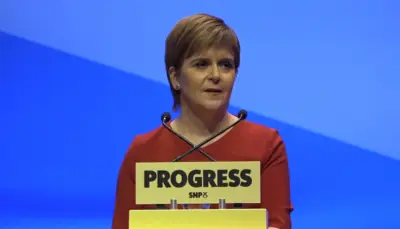While the headlines from Nicola Sturgeon’s speech may focus on the populist pledges such as setting up a publicly-owned energy company and scrapping council tax for care leavers, the general tone and content of this afternoon’s key address was intended to position the SNP as the only credible party in Scotland.
The First Minister took aim at her rivals from the off, stating that she had ‘come prepared’ as she produced a packet of Strepsils in reference to the Prime Minister’s cough-filled speech earlier in the week. She went on to ridicule the idea that Scotland had reached ‘peak Nat’, referencing the enduring popularity of her party in the polls, condemning the ‘xenophobia’ of the Conservatives, and mocking Scottish Labour’s in-fighting as it conducts its ‘annual leadership contest’.
She repeatedly emphasised that the Scottish Government was ‘delivering for all of Scotland’, highlighting free tuition fees, a new housebuilding programme, and ‘world-leading’ climate change goals – including support for renewable energy. The First Minister also confirmed plans to launch a publicly-owned, not-for-profit energy company, and although we await further detail as to the exact function of this new company, delegates in the audience greeted the news with a standing ovation.
There were also pledges on alleviating period poverty, delivering a fairer taxation system, and doubling funding for early-years childcare, as well as a condemnation of the violence in Catalonia and a call for powers over immigration policies to be devolved to Holyrood.
As expected, Sturgeon was highly critical of the UK Government’s handling of the ongoing Brexit process, highlighting the impact that the EU Withdrawal Bill could have on devolved matters and describing it as a ‘power grab’. Her rallying cry of ‘hands off Scotland’s Parliament’ was given a rapturous reception in the hall.
She closed her speech with an attempt to reach out to her supporters who have become somewhat impatient in their wait for a second referendum on independence. In her efforts to pursue a more patient and pragmatic approach to IndyRef2 she has undoubtedly frustrated many in the party. In her closing remarks she admitted that she ‘did not yet know exactly’ when a choice on Scotland’s future might be made, but reaffirmed the SNP’s position as ‘the party of independence’ and pledged that it ‘will always make the case for independence’.
After a somewhat chastening 2017, where her party lost almost 40% of its MPs and plans for IndyRef2 were put on the backburner, time will tell whether the First Minister can reinvigorate both her party and the general public with her vision for Scotland.




